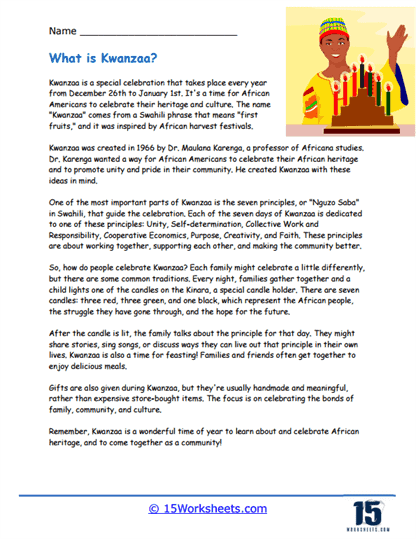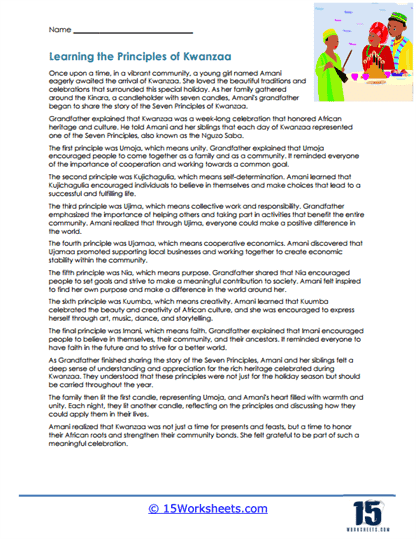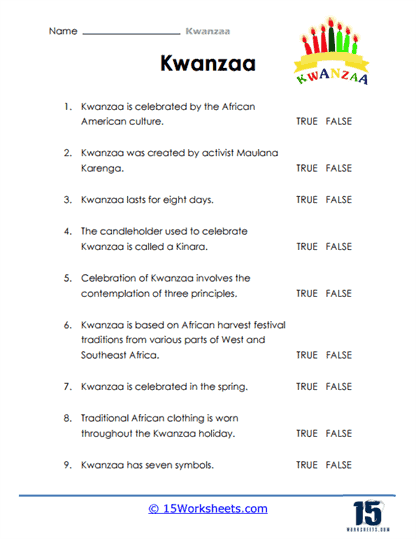Kwanzaa Worksheets
About These 15 Worksheets
The collection of Kwanzaa worksheets provides a comprehensive educational experience for students, focusing on a variety of skills including reading comprehension, problem-solving, cultural awareness, and vocabulary development. The content is crafted to help students not only learn about Kwanzaa but also strengthen their critical thinking and literacy skills in an engaging and culturally enriching way.
These worksheets promote reading comprehension and knowledge-building through passages that introduce the history and principles of Kwanzaa. By presenting key facts and ideas about Kwanzaa, students are encouraged to read, absorb, and process information about African American heritage and culture. The passages guide students in understanding the significance of Kwanzaa and its symbols, while also providing foundational knowledge that can support further discussions in the classroom about culture, identity, and heritage.
The worksheets incorporate problem-solving and mathematical reasoning. Through word problems related to Kwanzaa, students engage with practical math scenarios, such as dividing presents or calculating time over the seven-day holiday. These exercises connect math to real-life situations, using the context of Kwanzaa to make abstract concepts more relatable. Students are asked to apply skills like multiplication, division, and addition in culturally relevant situations, which not only reinforces their math skills but also deepens their understanding of the holiday’s traditions.
The worksheets offer a vocabulary-building exercise through activities that familiarize students with the terminology and symbols of Kwanzaa. Matching exercises, such as identifying items like the Kinara or Mkeka, introduce students to new words associated with the celebration. This type of activity enhances students’ understanding of key concepts while improving their ability to recognize and use culturally specific vocabulary in context. It is an excellent way to build both language skills and cultural awareness.
True-or-false activities reinforce comprehension and memory retention. These exercises challenge students to recall facts and correct misconceptions about Kwanzaa, providing a quick yet effective review of key concepts. The format is simple, but it encourages careful reading and comprehension as students determine whether each statement about Kwanzaa is accurate or not.
What is Kwanzaa?
Kwanzaa is a special celebration that takes place from December 26th to January 1st each year. It was created in the 1960s by Dr. Maulana Karenga, a professor and activist, to honor African-American culture and heritage.
During Kwanzaa, people come together to celebrate their African roots, values, and community. The name “Kwanzaa” comes from the Swahili phrase “matunda ya kwanza,” which means “first fruits.” It represents the idea of giving thanks for the harvest and the blessings of the year.
Kwanzaa is based on seven principles, known as the Nguzo Saba, which are values that help guide people to live a meaningful and purposeful life. Each day of Kwanzaa focuses on one of these principles, and families often gather to discuss and reflect on them.
The seven principles of Kwanzaa are:
Umoja (Unity): This principle emphasizes the importance of togetherness and working together as a community.
Kujichagulia (Self-Determination): It encourages individuals to define and shape their own paths in life.
Ujima (Collective Work and Responsibility): This principle promotes the idea of working together to help and support one another.
Ujamaa (Cooperative Economics): It emphasizes building and supporting businesses and economic development within the community.
Nia (Purpose): This principle encourages individuals to set goals and work towards fulfilling their purpose in life.
Kuumba (Creativity): It highlights the importance of using creativity to make positive contributions to the community.
Imani (Faith): This principle emphasizes the belief in oneself, family, community, and the future.
During Kwanzaa, families often decorate their homes with colorful African symbols, artwork, and the Kwanzaa flag, which has three colors: black, red, and green. They also display a special candle holder called a kinara. The kinara holds seven candles, representing the seven principles of Kwanzaa. One candle is lit each night, starting from the outer candles and moving inward.
Another important symbol of Kwanzaa is the mazao, which are fruits, vegetables, or other crops that represent the harvest. These are often displayed on a special mat called the mkeka.
Throughout the week, families come together to share stories, sing songs, dance, and enjoy delicious traditional foods. Some traditional foods eaten during Kwanzaa include cornbread, sweet potatoes, collard greens, and various African dishes.
Kwanzaa is a time for reflection, celebration, and honoring African heritage. It is a special holiday that promotes unity, creativity, and a sense of pride in African-American culture and community.
So, that’s Kwanzaa! It’s a week-long celebration that focuses on important values and principles, honoring African heritage and bringing families and communities together. It’s a time to reflect on the past, celebrate the present, and look forward to a bright future.



















